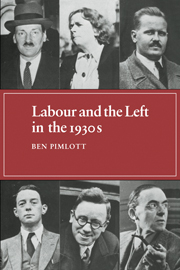Book contents
- Frontmatter
- Contents
- Dedication
- Acknowledgements
- Glossary of initials
- 1 Introduction
- PART ONE LABOUR AND THE CRISIS
- 2 Watershed
- 3 Leadership
- 4 Fabians and Keynesians
- 5 Labour and the Left: the Socialist League
- 6 Radicalism or Socialism?
- PART TWO UNITED FRONT
- PART THREE RANK AND FILE
- PART FOUR ALLIANCE
- Appendix
- Notes
- Bibliography
- Index
- Frontmatter
- Contents
- Dedication
- Acknowledgements
- Glossary of initials
- 1 Introduction
- PART ONE LABOUR AND THE CRISIS
- 2 Watershed
- 3 Leadership
- 4 Fabians and Keynesians
- 5 Labour and the Left: the Socialist League
- 6 Radicalism or Socialism?
- PART TWO UNITED FRONT
- PART THREE RANK AND FILE
- PART FOUR ALLIANCE
- Appendix
- Notes
- Bibliography
- Index
Summary
THE PURSUIT OF POLICY
An immediate effect of electoral defeat was to induce the Labour Party to re-think its policy. In December the NEC set up an eight-man Policy Committee, composed of the Executive's three representatives on the National Joint Council, four other members of the Executive, and Lansbury, as leader of the PLP. ‘[F]or the next twenty years,’ wrote Dalton, ‘Morrison and I were the two whose membership was most continuous and who did most work.’ The Policy Committee flourished, spawned numerous sub-committees which made extensive co-options, and issued a series of documents which formed the basis for the policies adopted by the Executive and Conference. The Committee worked closely with the Party Research Department under Arthur Greenwood, and was fed with ideas and information by sympathetic experts and unofficial research groups. Of the latter, two of the most influential were the New Fabian Research Bureau (NFRB) and the XYZ Club.
The New Fabian Research Bureau had been founded in March 1931 by G. D. H. Cole ‘to inject a more lively spirit into politics, not by trying, like the ILP, to write a new programme for the Party, but by calling attention to what had been promised and suggesting ways and means of carrying it out.’ Initially it operated as a Siamese twin to another Cole body, the Society for Socialist Inquiry and Propaganda (SSIP), before the latter merged itself into the left-wing Socialist League. NFRB membership was open, but always extremely small.
- Type
- Chapter
- Information
- Labour and the Left in the 1930s , pp. 36 - 40Publisher: Cambridge University PressPrint publication year: 1977



